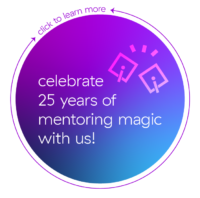Recently, iMentor Bay Area hosted an event called ‘Cultivate to Educate: A Celebration of Black Leadership.’ During the evening, panelist Leniece Brissett touched on a topic that prompted iMentor Program Manager (and Oakland native) Carol Ashley to continue reflecting after the evening concluded.
Black History Month has come to a close, and the world has changed dramatically since February, but a moment from our recent Cultivate to Educate event still lingers in my mind. The panelists addressed the black experience in the Bay, and in Oakland specifically. Themes related to leadership, inclusion, higher education all struck a chord in me in one way or another that night, but one moment in particular stands out. Panelist Leniece Brissett talked about navigating her blackness in mostly non-black work and social spaces. This theme is not uncommon for many Black Americans living in a region like the Bay Area that’s becoming more and more gentrified by the day. It is a reality I struggle with, and is tied to my own experience with impostor syndrome within my academic and professional spaces.
My first recollection of being a black face in a non-black space is from high school, when I took my first honors course. I initially felt a sense of pride at finally having my abilities acknowledged, but on the first day, I looked around and noticed the stark difference in demographics from my non-honors classes. It gave me pause. I was one of maybe three black students in the class, where the majority of students were white or Asian. Being among this demographic shook me to my core in ways I didn't expect.
Through high school, this continued. I stayed on the honors track, and lost the comfortable feelings of familiarity and having an unspoken language. When writing papers and working on group projects, I looked around at who I had left to confide in, and found myself questioning my abilities and academic worth.
This feeling of otherness only strengthened in college, where I studied Sociology. Huge lecture halls and small group sections felt like spaces where mostly white minds were welcome to discuss and debate what we learned. This became the norm as each quarter went by and I did not feel as though my opinion mattered. In the rare instances where I did have fellow black students in my courses, I made it a point to join them in discussion sections and group projects. I noticed how safe I felt in spaces where I could freely discuss any confusion I had with the material or confidently teach-back terms to my classmates. But due to the lack of diversity in my classes, those instances were few and far between.
During the Cultivate to Educate Panel, the panelists were asked, "What does diversity and inclusion look like in the workplace?". Leniece made a point to note that companies are not doing enough if diversity is not represented in higher levels of leadership. A company is not truly prioritizing its workers if employees don't see a path toward leadership that represents them.
This made me think about my first experience of belonging in the workplace, which happened with iMentor. iMentor is my third job, post-graduation, and it wasn't until the latter half of my first year that I truly felt a sense of belonging in the professional world. This happened when I first met Ola Whitney, iMentor’s Chief Regional Officer. Before meeting Ola, I had never encountered a black woman in a high executive leadership position within my realm of work.
I soon found that speaking openly to Ola—about my early experiences, impostor syndrome, and how I show up to work as my authentic self—was the piece I had been missing. Around that time, iMentor’s Black Women's Affinity Group was formed, and I had yet another space to network with other black women within iMentor. I have laughed, shed a few tears, expressed gratitude, and felt forgiveness within the space. I hold the group very near to my heart, and strongly feel that these spaces are a move in the right direction for companies like iMentor, as they work toward prioritizing diversity and inclusion.
Currently, my desire to look for those I can identify with within the work-space feels less urgent. I am thankful to have Caleb Logan, a junior program manager, and my affinity group to lean on when the familiar feeling of imposter syndrome starts to arise. My imposter syndrome has also decreased significantly since joining iMentor, which I attribute that to the communities of people I have met and can confide in within the organization.
It is so important to have space where we can be our authentic selves and feel comfortable doing so in the workplace. As for finding my community in social areas in the South Bay, it is still an ongoing journey, but one I may eventually put on the back burner, as I begin to find those spaces closer to home in Oakland.
